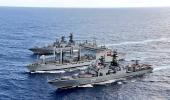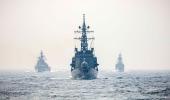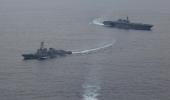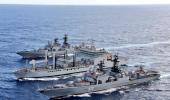'I do not that the intent was to send a political message to China that the US treats friends and foes alike.'
'In any case, such acts do not ruffle a feather in China,' observes Commodore Venugopal Menon (retd).
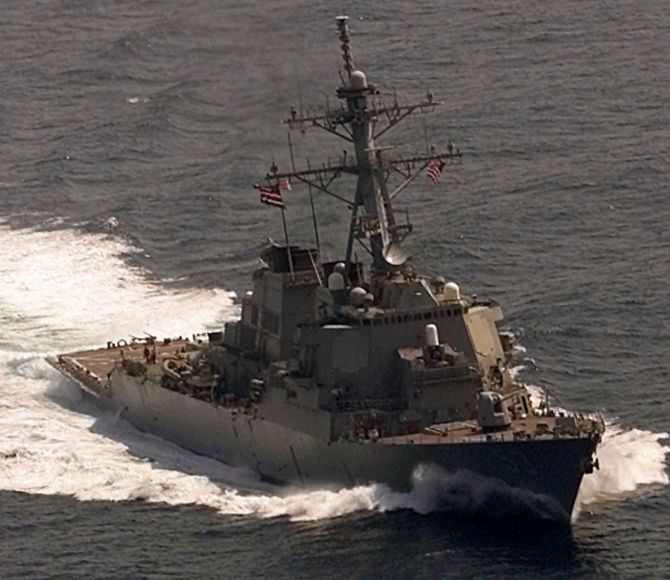
In a highly aggressive move, the US navy publicly announced that it conducted 'freedom of Navigation' operation in India's Exclusive Economic Zone (EEZ) about 130 nautical miles west of the Lakshadweep islands last week without New Delhi's prior consent.
What is shocking is the US navy's seventh fleet spokesperson' statement: 'The Arleigh Burke class missile destroyer USS John Paul Jones asserted navigational rights and freedoms around 130 miles west of the Lakshadweep islands on 7th April without requesting India's prior consent.'
'We conduct routine and regular FONOPs as we have done in the past and will continue to do so in future. FONOPs are not about one country, nor are they about making political statements.'
'The US forces operate in the Indo-Pacific region on a daily basis, with all operations designed in accordance with international law and demonstrate that the US will fly, sail and operate wherever international law allows,' the spokesperson added.
The strongly worded nature of the seventh fleet statement was evident as it said India's requirement of prior consent is inconsistent with international laws and the freedom of navigation operations was intended to challenge its excessive maritime claims.
In this context, it is prudent to understand India's stated position on the United Nations Convention on the Laws of the sea (UNCLOS), that the convention does not authorise other states to carry out in the EEZ and on the continental shelf, military exercises or maneuvers, in particular those involving the use of weapons or explosives without the consent of the coastal state.
India's domestic laws hold any country carrying out military maneuvers in its EEZ must provide prior notification.
Although there are many articles suggesting that nothing untoward has happened and the US Navy is well within its rights to exercise freedom of navigation through our EEZ, I have a different view with respect to the interpretation of SRL 3 of Article 58 of THE UNCLOS which deals with rights and duties of other states in the exclusive economic zone.
Quote 'In exercising their rights and performing their duties under this convention in the exclusive economic zone, states shall have due regard to the rights and duties of the coastal state and shall comply with the laws and regulations adopted by the coastal state in accordance with the provisions of this convention and other rules of international law in so far as they are not incompatible with this part.'
In this regard, it is pertinent to mention that the Maritime Zones of India Act 1976 has laid down certain provisions for transit of warships through territorial waters only with prior notice to the central government and the same is extendable up to contiguous zones.
As far as the EEZ is concerned India had raised certain reservations on military maneuvers at the time of signing and accession to UNCLOS and those issues remain pending to date.
UNCLOS has many ambiguities and the interpretation of article 58 is one of them, and navies have been exploiting it ever since.
However statements of such exploits to challenge the local regulations of a coastal state are high headed and uncalled for.
I do not agree with the statements of analysts that the intent was to send a political message to China that the US treats friends and foes alike.
In any case such acts do not ruffle a feather in China.
Official sources have claimed on record that the warship was tracked by the Indian authorities throughout her passage.
Here are a few questions that I would like to raise to the establishment.
- Since the Indian Navy was tracking the ship, is it definite that the political establishment was kept fully in picture?
- Did the government give orders to shadow the ship and appraise them politely to keep clear of our EEZ which is the standard norm?
- Were there any exchange of communications between the US navy ship and Indian Navy/Coast Guard?
- Why did the establishment wake up only after seeing the statement from the 7th fleet?
- Had the 7th fleet not made a statement, are we to believe that the whole issue would have been brushed under the carpet in order to appease Washington?
- Indian warships in the past have chased away Chinese research vessels entering our EEZ in the Indian Ocean and engaging in suspicious activities after suitable warnings. Why didn't it chase away the US navy ship?
What concerns me most is the shape of things to come.
There has been a substantial increase in the number of naval ships deployed in the Indian Ocean region notably from the US.
If this trend continues, the Indian Ocean would turn out to be the venue for the games big boys play.
This situation is attributed to the decade's long negligence of the maritime domain in our area of interest by India.
It is but natural that big powers would step in to fill the vacuum and enforce their rights in accordance with their national interests.
When we seek claim to our EEZ of 200 nautical miles (we have proposed to increase it to 350 nautical miles), it is important that we have adequate maritime resources, assets, and political will to implement our intent or otherwise it tantamount to firing a blank/dummy shell.
Hence, it is important to consider this incident as a wake-up call and focus on capacity building of maritime resources.
One needs to note that the relevance of sea power would increase exponentially in the coming decades and we should not be caught flat footed or found wanting.
We need to seriously take a relook on the role as a net security provider in the Indian Ocean Region rather than accepting big powers to don that mantle.
The late Sardar K M Panicker was spot on when he stressed on the strategic importance of the Indian Ocean: 'It is the oceanic space that dominates the strategy of the Indian defence. But the oceanic space around India is a gigantic power vacuum. Big nations are planning to fill it in their own way. The American decision to extend the operational sphere of the 7th fleet from the South China Sea to the waters of Indian Ocean, announced in December 1963, is significant in this context.' The great historian's predictions are turning out to be true!!
Commodore Venugopal Menon served in the Indian Navy for 29 years in operational roles, including commands at sea, and training and staff assignments at Naval HQ.
In addition to the staff and war courses in the Indian Navy, he underwent the executive course at the Asia Pacific Centre for Security Studies, Honolulu.
Post retirement he worked in Oman as the head of operations and logistics for a shipping company.
Feature Presentation: Aslam Hunani/Rediff.com

